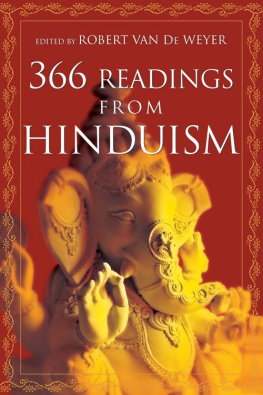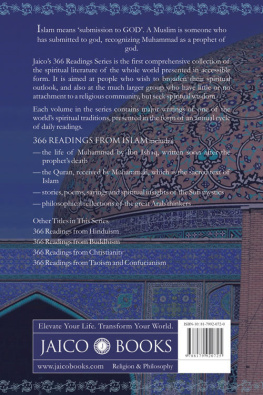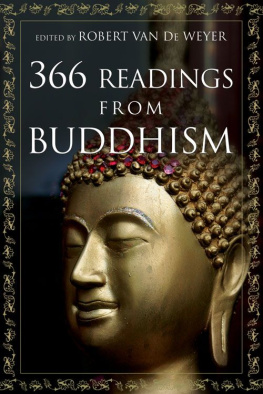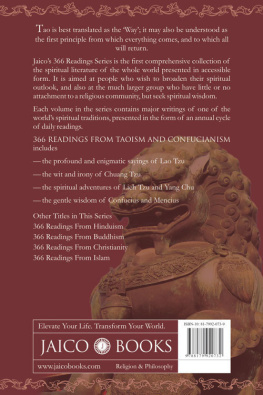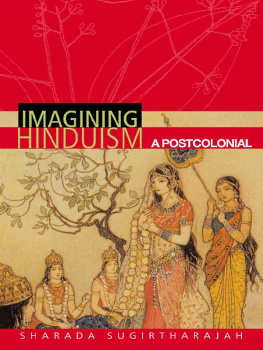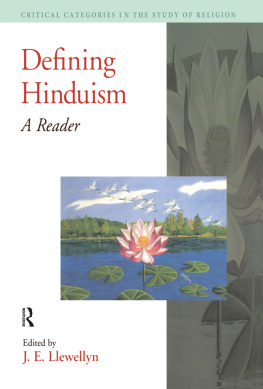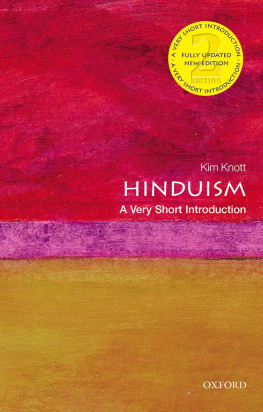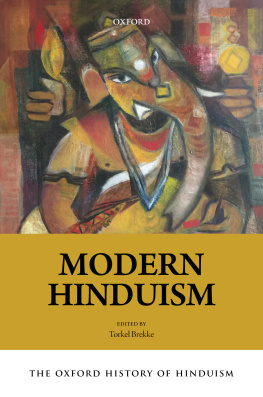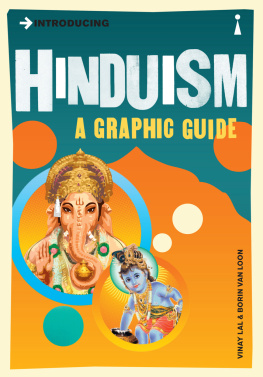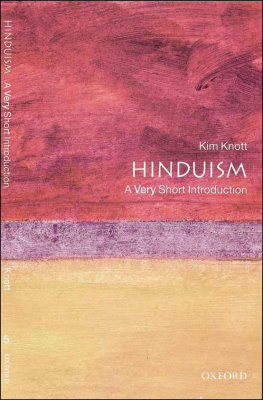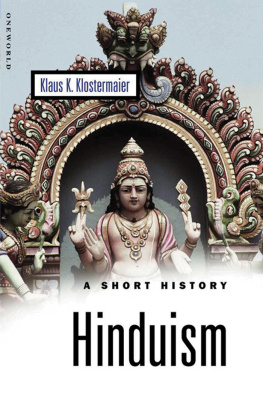Robert Van De Weyer - 366 Readings From Hinduism
Here you can read online Robert Van De Weyer - 366 Readings From Hinduism full text of the book (entire story) in english for free. Download pdf and epub, get meaning, cover and reviews about this ebook. year: 2013, publisher: Jaico Books, genre: Religion. Description of the work, (preface) as well as reviews are available. Best literature library LitArk.com created for fans of good reading and offers a wide selection of genres:
Romance novel
Science fiction
Adventure
Detective
Science
History
Home and family
Prose
Art
Politics
Computer
Non-fiction
Religion
Business
Children
Humor
Choose a favorite category and find really read worthwhile books. Enjoy immersion in the world of imagination, feel the emotions of the characters or learn something new for yourself, make an fascinating discovery.
- Book:366 Readings From Hinduism
- Author:
- Publisher:Jaico Books
- Genre:
- Year:2013
- Rating:4 / 5
- Favourites:Add to favourites
- Your mark:
- 80
- 1
- 2
- 3
- 4
- 5
366 Readings From Hinduism: summary, description and annotation
We offer to read an annotation, description, summary or preface (depends on what the author of the book "366 Readings From Hinduism" wrote himself). If you haven't found the necessary information about the book — write in the comments, we will try to find it.
366 Readings From Hinduism — read online for free the complete book (whole text) full work
Below is the text of the book, divided by pages. System saving the place of the last page read, allows you to conveniently read the book "366 Readings From Hinduism" online for free, without having to search again every time where you left off. Put a bookmark, and you can go to the page where you finished reading at any time.
Font size:
Interval:
Bookmark:
READINGS
FROM
HINDUISM
EDITED BY
ROBERT VAN DE WEYER

JAICO PUBLISHING HOUSE
Ahmedabad Bangalore Bhopal Bhubaneswar Chennai
Delhi Hyderabad Kolkata Lucknow Mumbai
Published by Jaico Publishing House
A-2 Jash Chambers, 7-A Sir Phirozshah Mehta Road
Fort, Mumbai - 400 001
www.jaicobooks.com
Arthur James Ltd.
Translation, Compilation and Editing
Robert Van de Weyer
Published in arrangement with
John Hunt Publishing Ltd.
46a West Street, New Alresford
Hants SO24 9AU, UK.
366 READINGS FROM HINDUISM
ISBN 81-7992-070-4
First Jaico Impression: 2003
Twelfth Jaico Impression: 2013
No part of this book may be reproduced or utilized in
any form or by any means, electronic or
mechanical including photocopying, recording or
by any information storage and retrieval system,
without permission in writing from the publishers.
CONTENTS
Also in the Global Spirit Library
366 readings from Islam
366 readings from Buddhism
366 readings from Taoism and Confucianism
366 readings from Christianity
SERIES INTRODUCTION
The Global Spirit Library is the first comprehensive collection of the spiritual literature of the world, presented in accessible form. It is aimed at people who belong to a particular religious community, and wish to broaden their spiritual outlook; and at the much larger group, perhaps the majority of people in the world today, who have little or no attachment to a religious community, but seek spiritual wisdom. Each book contains the major writings of one of the world's spiritual traditions.
Much of the world's spiritual literature was designed to be read or heard in small portions, allowing ample time for personal reflection. Following this custom, the books in The Global Spirit Library each consist of an annual cycle of daily readings. Two or more books may be read in parallel at different times of the day; or an entire book may be read straight through. Again following a time-honoured practice, many of the original texts have been condensed.
Spiritual traditions differ from one another in their theological formulations; and the history of humankind is blighted by rivalry between different religious communities. Yet theology is no more than human speculation about truths that are beyond the grasp of the human mind. The writings in these books amply demonstrate that, as men and women actually experience these truths within themselves and others, divisions and rivalries fade, and unity is found. May the third millennium be an era of spiritual unity across the globe.
INTRODUCTION
Hinduism means the religion of the India. A Hindu may be defined as someone who regards the ancient sacred texts of India as authoritative and by this definition there have been Hindus from every nation and continent.
The Hindu religious tradition began with the arrival of Aryan people from central Asia about three and a half millennia ago. They adopted some of the religious ideas of the previous civilization which had flourished in the Indus valley in north-west India; and gradually they developed a religion of their own. From an early date there were two quite distinct kinds of religious leader: priests, who performed religious rituals, and whose office passed from father to son; and sages, who had acquired great spiritual wisdom, and whose advice and insights were eagerly sought. Frequently a sage attracted a community around him; and the community might survive his death, preserving his sayings either by oral repetition or in written form. These written records are the kernel of Hindu sacred literature.
THE VEDAS
The Vedas were composed over several centuries after about 1200 BCE . The term 'veda' means sacred knowledge; and the Vedas are said to be based on direct communication from the divine to Hindu sages.
The most ancient and famous of the Vedas is the Rig Veda, a collection of more than a thousand hymns. They are about God and addressed to God in various forms; and they are filled with startling images and paradoxes. They were recited at acts of worship the word 'rig' denotes a priest's chant. The last of the Vedas, the Atharva Veda, is personal, consisting of meditations and incantations which individuals can use.
The God of fire
I pray to the God of fire, the God of the sacrifice, the one whose chants and hymns bring greatest blessing.
The God of fire inspired the ancient sages to pray, and he inspires the sages of the present time to pray also. He surrounds us with divine blessings. Through the God of fire we may win wealth and health; we may have many offspring, whose actions will make us proud.
The sacrificial rituals which the God of fire demands, encompass every aspect of our lives. The rituals are effective: whatever blessings the God of fire wishes to bestow on his worshippers, will be bestowed.
We come day by day to the God of fire, offering to him our thoughts and our hopes. He shines in the darkness of our minds. We can reach him as easily as children can reach their parents. He dwells among us, and makes us happy.
Rig Veda 1:1.14, 67, 9
The cosmic tree
No being is equal to you, God of nature, in sovereignty and power. No being is equal to you in courage. No bird can fly as swiftly as you can. No river can move with such force as you do. No mountain can stand as firmly against the raging wind as you can.
You are a cosmic tree whose roots are at the bottom of the deepest ocean, whose top supports the sky, and whose branches spread across the entire universe. And you also grow within each living creature.
You fashioned the sun, and you steer it through the sky. You give feet to those who are lame, and you bring peace to anguished hearts. You give the power of healing to a hundred thousand men and women. You ward off illness, and protect us from ageing before our time. You deliver us from the bonds of sin.
You set the stars in their places, to form constellations for all to see. Where do they go by day? You have made laws which are clear in meaning and purpose. At night the moon rides into the sky, displaying her beauty.
We praise you with sacred words, and we offer sacrifices to you, in the hope that you will bless us. God of nature, do not be angry with us. We strive to obey your laws; do not rob us of life.
Rig Veda 1:24.611
The dawn
Look at how the dawn has set up her banner on the eastern horizon. She has adorned and anointed herself with sunlight. She is throwing lights of red and gold into the sky.
She is singing as she sets about her work. She has come from a distant place on a chariot drawn by tawny cows, who emit a soft light. She brings food day by day to those who act righteously, to those who are generous, and to priests who perform their rituals with care.
Like a dancing girl she decorates herself with bright ornaments. She uncovers herself, revealing breasts as swollen as those of a cow ready to be milked. From her breasts come light that fills the entire universe. She breaks out of the darkness, as cows break out of their pens.
Her brilliant flame becomes visible once more. She pushes forward, driving back the formless darkness of the night. She gazes out at all the creatures of the world, and sends her light straight into every eye. She awakens all that lives and she gives words to every poet.
This divine being is born again and again each morning, always dressed in the same colours. She causes men and women to grow older, pulling them across their span of life. She is a cunning gambler whom no one can outwit.
Next pageFont size:
Interval:
Bookmark:
Similar books «366 Readings From Hinduism»
Look at similar books to 366 Readings From Hinduism. We have selected literature similar in name and meaning in the hope of providing readers with more options to find new, interesting, not yet read works.
Discussion, reviews of the book 366 Readings From Hinduism and just readers' own opinions. Leave your comments, write what you think about the work, its meaning or the main characters. Specify what exactly you liked and what you didn't like, and why you think so.

